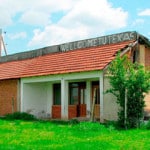- Apocalypse Town
DiverseWorks presents the world premiere of Apocalypse Town, a musicological memoir of a northern Kosovo, its music and Anthony Barilla’s experiences living there. The work is part monologue, part travelogue, and part concert. The performance features adaptations of Kosovo songs ranging in style from epic folk to hip hop to punk. At the same time, is also an examination of collective memory: the collective memories of that town, and our American collective memory—specifically our memories of a war and a place that most Americans have forgotten – a war that American fought only 13 years ago.
Barilla moved to Mitrovica, Kosovo five years ago, when his wife accepted a position monitoring and analyzing human rights issues for an international organization. Apocalypse Town is an account of his personal and musical experiences there.
About the Town
Bisected by the Ibar River into an Albanian south and Serbian north, the town of Mitrovica remains a flashpoint for Kosovo’s unresolved political and social tensions. These tensions have increased since Kosovo’s government declared independence three years ago. Hardliners on both sides of the river raised the stakes with protests, political maneuvers and physical confrontations. Most recently, concrete and gravel roadblocks have been erected around the Serbian half of the city. To date, Mitrovica remains in a state of suspended animation politically and economically while Kosovo has become a major thoroughfare for arms, drugs and human trafficking and a haven for corruption and organized crime of all sorts. It can also be a very pleasant place to live.
About the Songs
The story of Apocalypse Town was largely inspired by two bands: a rock band that disappeared with the conflict, and a punk band that arose after the war had ended. But, the songs are drawn from a wide variety of styles and ethnic sources and trace the particular history of music in Kosovo. The diverse selection includes the epic folk songs of Augustina Ukaj, the hip hop of DJ Blunt, popular songs of the 60’s and 70’s by artists like Nexhmije Pagarusha and Muharrem Qena, the 80’s rock of Viktorija and the modern punk of Hosenfefer. Most of the songs were adapted from translations by Abdullah Ferizi and, when possible, used by permission of the original authors, many of which remain largely unknown outside of Kosovo.
The songs of Apocalypse Town have a social meaning in Mitrovica and Kosovo beyond their potential artistic meaning. The predominate musical style preceding and following the dissolution of Yugoslavia has been turbo-folk, a blend of nationalist themes and techno styles that is at turns vapid, insidious, hyper-sexual, aspirational, jingoistic and always inescapable. In this context, other musical styles—and especially rock and pop—represent an alternate universe of what might have been for the people of that town and their artists.
Apocalypse Town does not just exist in the theater. The companion book contains extensive background information on the performance’s songs, as well as additional writing, photography, maps, secrets, lyrics, extra songs and other helpful and confounding materials related to the show. The book was edited and designed by Lindsay Kayser. Some illustrations were provided by Cathie Kayser and Tim Thomson.
The Truth and Reconciliation Commission are Chris Bakos, Wayne Barnhill, Kevin Blessington, Jeff Miller, Cathy Power and Kirk Suddreath, with a special guest appearance by John Duboise. The companion albums were recorded by Anthony Barilla and Chris Bakos, with performances by Barilla, Bakos, Power, Forster and Ruud Borgers.
Much of Apocalypse Town was conceived during two residencies. The first took place in 2009 at the MacDowell Colony and the latter in 2010 as part of the Brown Foundation Fellows Program at the Dora Maar House in Ménerbes, France.
About the Artist
Anthony Barilla is a composer, musician and theater artist best known for his work with Infernal Bridegroom Productions, a Houston-based theater company widely respected for their challenging ensemble work. Between 1998 and 2007 he worked on 35 IBP productions, including the world premieres of works by Tamarie Cooper, Lisa D’Amour, Brian Jucha, Suzan-Lori Parks and Jason Nodler. In 2003 he was named IBP’s artistic director. During his tenure, Barilla was responsible for, among many other things, the development and musical direction of Speeding Motorcycle, a rock opera based on the songs of Daniel Johnston that went on to receive national attention and critical acclaim. He has composed scores for theater companies in Houston, Atlanta, Austin and Pittsburgh as well as for Public Radio International’s This American Life, and he writes and records his own songs under the name “The Truth and Reconciliation Commission.”
In Kosovo he founded Blackbird Books, a non-profit library, bookstore and cafe. He has directed two theater projects in Kosovo with the support of the Swiss Cultural Programme in the Western Balkans. He regularly works with some of the region’s best young musicians at the Mitrovica Rock School, an inter-ethnic initiative of Musicians Without Borders aimed at restoring the city’s proud rock music culture. He’s also been lucky enough to work with some of the regions best older musicians, many of whom he wrote about in Apocalypse Town, and he regularly tours and performs with a Serb/Bosnian/Dutch/Texan rock outfit called R.O.T.S.

